Why My Best Life Choice was Finishing College Early for NOLS
Have you ever woken up in a world you’d created for yourself, only to realize you didn’t belong there anymore?
This happened to me at the beginning of my senior year of college, after I’d spent three years reaching for the things I thought mattered.
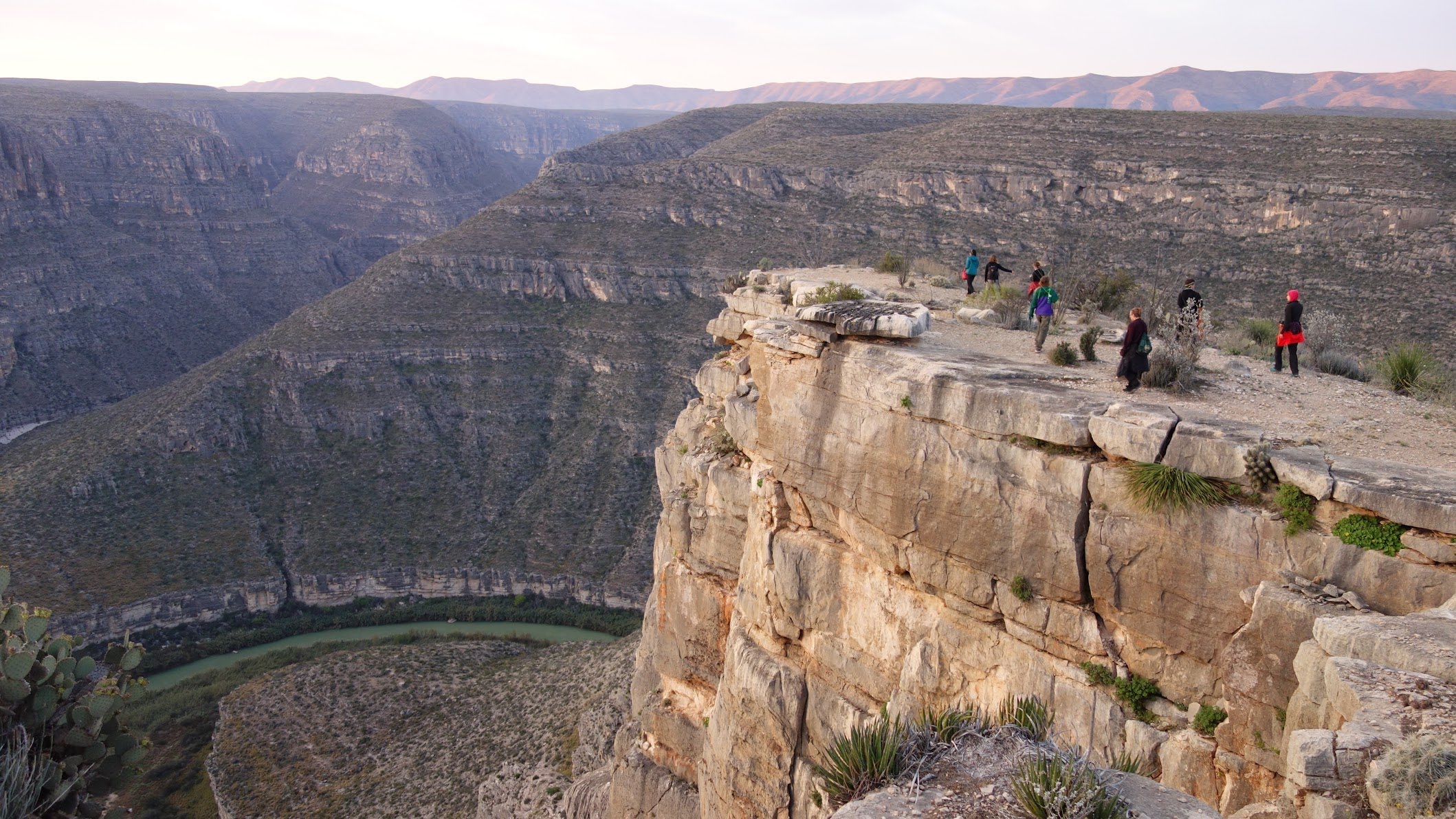 We got up at 5:00 a.m. to make it up to this beautiful cliff. I’ll never forget this morning when we got to appreciate the scale of the Rio Grande Valley. Photo by Katherine Hancock.
We got up at 5:00 a.m. to make it up to this beautiful cliff. I’ll never forget this morning when we got to appreciate the scale of the Rio Grande Valley. Photo by Katherine Hancock.
Honor societies, grades, leadership roles, even social status—it all paled in significance after I took an ecology course in Grand Teton National Park in the summer following my junior year.
I spent a month with the knowledge that those 2.8 billion-year-old mountains could gobble up my twenty-one years in one bite. So why was I worried about my sorority meeting and my rush from class to diploma to graduate school?
This newfound knowledge—of being a piece of dust in the Earth’s geologic timeline—forced me to think differently about my life’s trajectory when I got back to school for the start of my senior year.

One of our most magnificent campsites. Photo by Katherine Hancock.
I found out that I could finish my degree in one semester. After that, I couldn’t imagine spending any more time in the world of college. I decided to do something that would put me in another world entirely. I decided to ditch my phone, deciduous landscapes, and research papers so that I could embark on the wildest thing I could think of: a NOLS Semester in the Southwest in Spring of 2019.
I was nervous that I wouldn’t be “good at” NOLS, but I also knew that I wanted a life change more than perfection.
That’s how I ended up in Arizona’s Galiuro Mountains in late January with an angry, red burn on my thumb, wondering yet again if I belonged in this world. This new world of acronyms, bags of freeze-dried food, topographical maps, weeks without a shower. On day one of the course, the question “Why am I here?” started ringing over and over again in my mind.
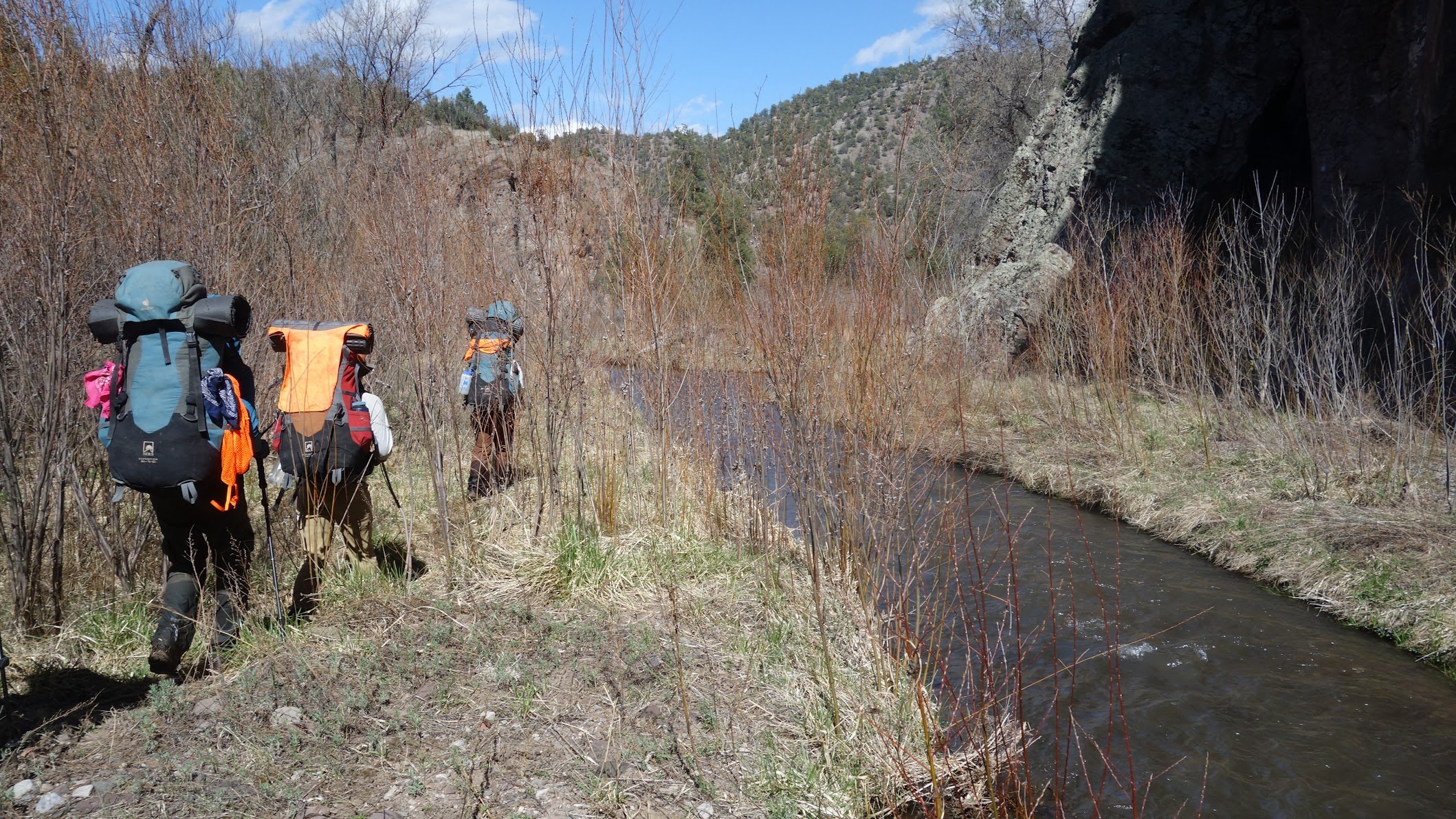
Learning navigation in the Galiuro Wilderness. Photo by Katherine Hancock.
Battling tears while caring for my burnt finger, I didn’t believe that I had what it took to be a successful NOLS student. Even filling up water from a creek was hard for me on that first backcountry morning. The semester consisted of five sections and would last 80 days: How could I make it through the whole semester learning backpacking, canoeing, caving, and climbing?
But I did make it.
Some days, I tore through the pages of my journal while the sun rose; other days, we broke camp before dawn to get on the trail. I stood in awe of the beautiful, ancient saguaros in all their dignity; I fumed with anger at the small spines in my fleece pants.
I shared in uncomfortable conversations with my coursemates about responsibility; I howled with laughter and abandon as my team threw me from a tarp into the air 22 times for my 22nd birthday. I felt helpless as I searched the dry landscape for a drainage for orientation on the map; I became more comfortable letting my team in on the moments of helplessness.
As we progressed, I was proud that I’d decided to finish college early and embark on this experience. By the end of the section, the burn on my thumb was just one of the many signs of weathering that marked my hands. Yet, I still couldn’t shake the feeling that I’d fooled myself when I decided that I was ready for this life change.
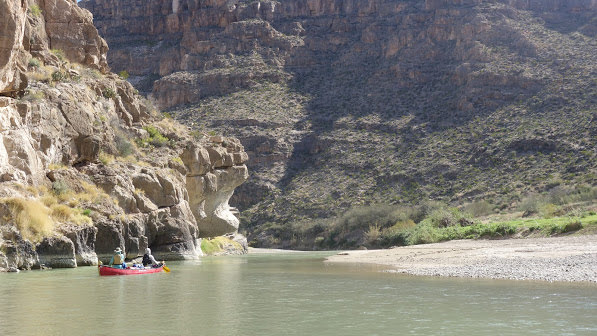 Every minute of paddling on the Rio Grande provided us with jaw-dropping views of blue-green water and tall canyons. Photo by Katherine Hancock.
Every minute of paddling on the Rio Grande provided us with jaw-dropping views of blue-green water and tall canyons. Photo by Katherine Hancock.
I’d gained competency and grown closer to my coursemates, but I still struggled. In particular, I struggled with confidence in my leadership, something that had always come easily to me before. This persisted into the second section: canoeing.
Because I didn’t feel secure about my technical skills, being a beginner, I froze with doubt when I had to serve my group as a Designated Leader. How was I supposed to recommend which strokes to use in a rapid when I still felt like I never acted quickly enough to pull them? How was I supposed to inspire patience in the others when I wanted to reach camp just as badly as everyone else? Why was it still so hard for me to manage cooking dinner and organizing group gear in the same night? Why was I having so much trouble asking for help?
Finally, after a difficult day of paddling, I had a breakthrough.
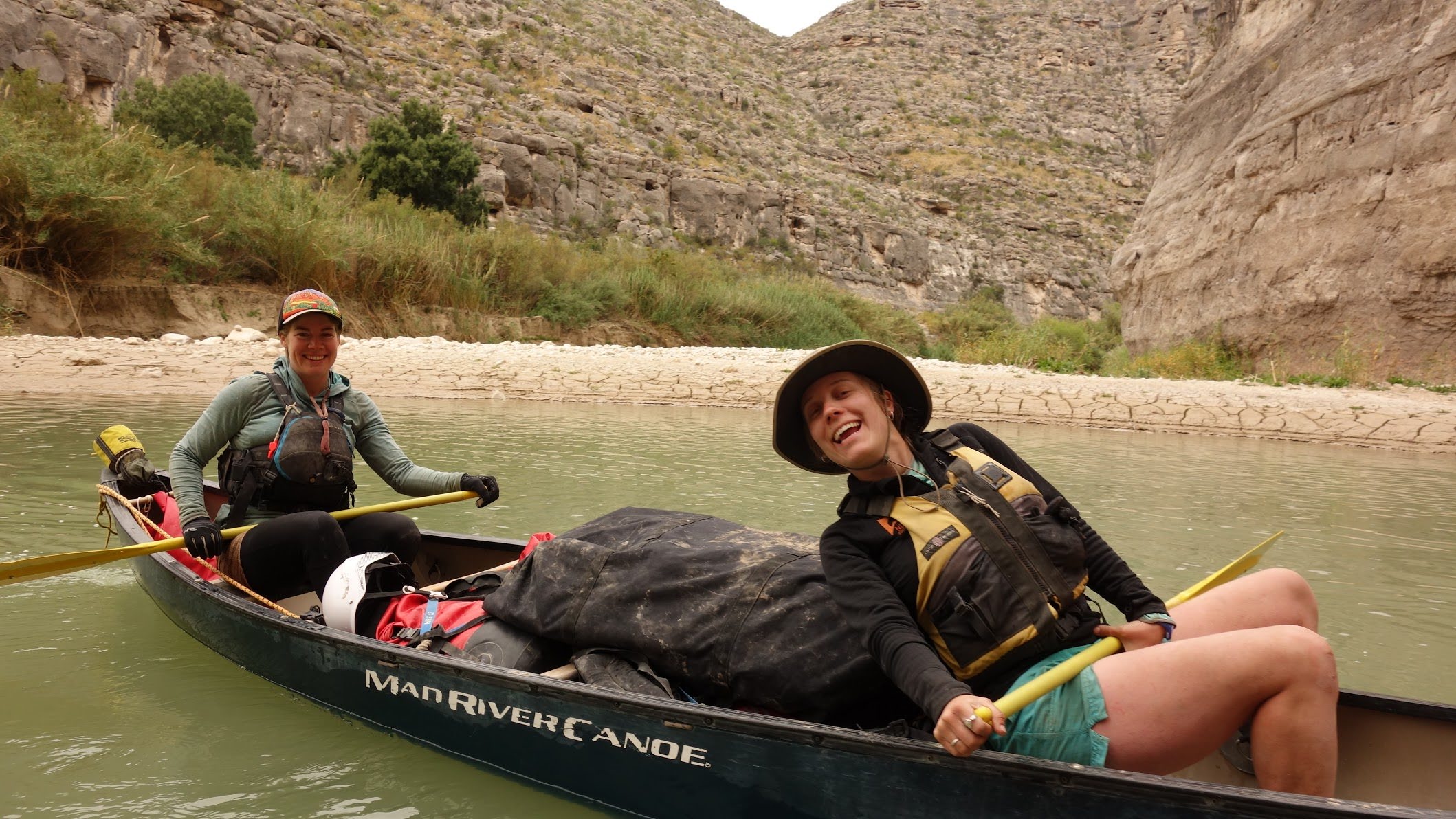 Enjoying friendship on the Rio Grande. Photo by Katherine Hancock.
Enjoying friendship on the Rio Grande. Photo by Katherine Hancock.I was meeting with Pam, one of my instructors who was just one of the many amazing mentors I had during my course. We were sitting on a bank of the Rio Grande, watching the sun set in purple and pink over cliffs that created walls miles beyond us. I dissolved into tears as I told her how I felt like I was so bad at everything I was asked to do on this course, and how it made me feel like I was letting down my coursemates and myself. I told her that I’d never realized I had confidence issues before because I’d spent so long doing school—something I’d excelled at by industry standards for about sixteen years.
Pam met my self-condemning with gentleness and empowerment. I remember her asking me why I would be good at something I’d just learned how to do—in this case, pulling a crossbow draw or lining a rapid.
She told me to exercise and practice self-compassion, reminding me that I would not treat a coursemate as harshly as I treated myself if one of them doubted themselves.
 Caving was one of the most wondrous parts of the course, and our instructors were so knowledgeable and experienced—we always felt safe! Photo by Katherine Hancock.
Caving was one of the most wondrous parts of the course, and our instructors were so knowledgeable and experienced—we always felt safe! Photo by Katherine Hancock.As soon as I had that conversation with Pam, I began to accept myself as a beginner. I also realized that my decision to leave a world I’d begun to feel too comfortable in was the bravest move I’d made.
I took that leap of faith and I landed safely in the arms of ten of the best coursemates and several of the best instructors I believe NOLS could put in one group.
Everything after that leap was just more practice in making peace with my ever-expanding comfort zone.
Every day for the rest of the course, I did things that scared me. Things that were risky, and made me embrace the power of adventure with other people in the natural world.
We were brave together: we learned how to communicate effectively and trust each other to belay climbs safely. We encouraged each other while ascending up and out of caves; we found adventure in learning how to read topographical maps and navigate without instructors.

Not only did we climb a lot, but we also learned how to place gear in case we ever wanted to lead climb. Our instructors were awesome about giving us skills that we could take on future climbing trips, which would make us competent and trustworthy adventure partners. Photo by Katherine Hancock.
In each of the moments and in all of the places our course took us, we made mistakes and had some really big wins. NOLS taught me and my coursemates how to take each experience and use our skills to remain safe and efficient.
But, at the end of the long days, what amazed me was how much we grew as people each section. As soon as we got comfortable and capable with the technical skills of one section, we began something new, hitting that sweet spot of growth that only stark novelty can deliver.
By the end of the canoe section in mid-February, the scab from my finger was nearly gone. I couldn’t believe how such a painful little burn could become nothing but a slightly pink mark on my skin. What had frustrated me to tears—feeling like a lost imposter, a naïve beginner who couldn’t even pour boiling water— began to feel as far away as my flight to Tucson in January.
My NOLS experience has now taken me into environmental education and trip leading in Vermont. Then, I’ll be on my way to Wyoming, where I’ll teach as a field educator in the beautiful mountains and rivers in and around Jackson Hole.
Every step of the way, I keep tabs on that pink spot on my thumb, now so faint that you’d miss it if you didn’t know it was there. If I have feelings of inadequacy, I glance at my thumb and then face the growth of being a beginner, feeling grateful to soak in so many new things in this beautiful world.
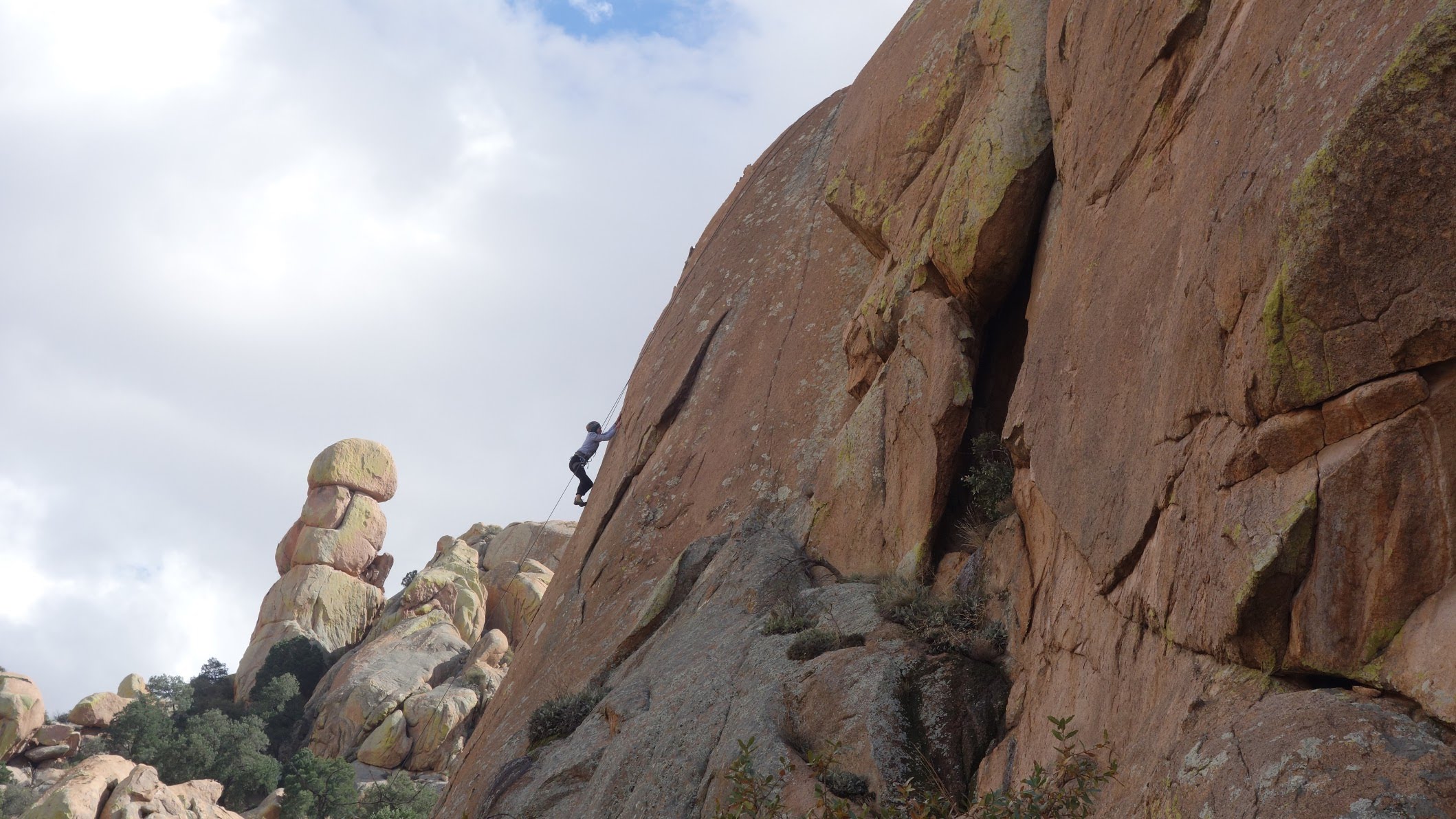 My coursemate, Grace, climbs one of the first crags we visited. Photo by Katherine Hancock.
My coursemate, Grace, climbs one of the first crags we visited. Photo by Katherine Hancock.Topics:
